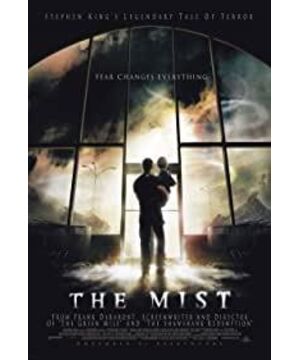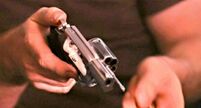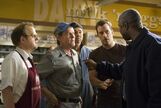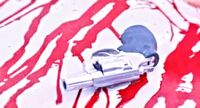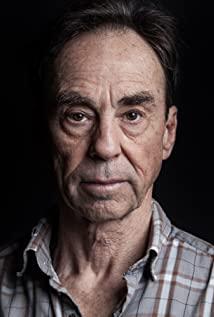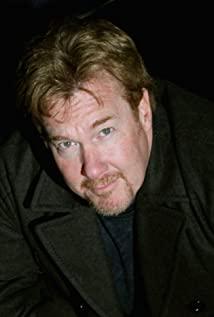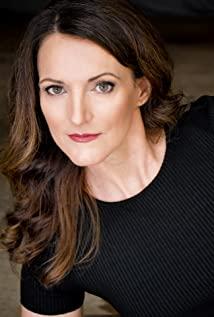Where does the fog come from? Fog is not made by nature but man-made. It was a scientific experiment by the military, an experiment carried out without notifying the local residents and predicting the serious consequences. Let’s see in the end, who survived, not the protagonists who dared to walk out of the fog, not the clergy who preached the sermons, but most of them were those who dared not touch the door that isolates the fog, swayed their positions, went with the flow, and stayed in the supermarket obediently. people in. Linking the first and the last, it is not difficult to link this story to a political conspiracy. In the story, politics, human nature, and religion check and balance each other, but as far as the narrative at the end is concerned, it is clear that politics has won the final victory.
The story begins in a fog. This fog has two functions, one is to block people's sight, so that people become unaware of their surroundings and their own life and death; the other is to induce genetic mutation of insects and mutate into super monsters with huge size and slaughter. This is a common trick used by rulers. The fog is equivalent to political rules, which people cannot see or touch, but must obey. It is not clear what secrets are contained in the rules, but it is this unknown that brings the first layer of deterrence. Then, the giant insects that symbolize the agency of state violence (harmony) arrive, and they make people realize what the price will be if they challenge the authority of the ruler behind the fog. People are starting to realize that the glass door that shatters at the touch is their bottom line.
However, the first reaction of human nature when it is suppressed is to resist, which is human instinct. At this time, the protesters had the upper hand, they made torches, prepared guns, and used various tools at their disposal to fight the violent (harmonious) force. Thus, a war began between the civilians and the insect army, and the result: the civilians were defeated. Please note that this is the only time in the entire film that the giant insects attack the supermarket. They are huge and powerful. Why not break the fragile glass and drive people out? From this question, its political metaphor becomes clear.
Faced with the bloody facts, people no longer dare to resist the unknown power in the mist. They held on to the glass door, the bottom line, and began to pray. People were angry but could not vent, so they began to look for other ways to explain the block in their hearts. At this time, religion took the upper hand. To people, religion is like a ray of light in a dark cave. Although I don't know what it is, there is hope. People are scrambling to grab this life-saving straw, hoping that she can get them out of the sea of misery. However, religion is not a simple belief, and in the eyes of the goddess, there is also a desire for power. In the name of God, she bewitched the hearts of people, made people obey her decisions, accepted her standard of good and evil, and controlled food and the lifeline of everyone. From this point of view, religion and politics are really the same raccoon dog. They both dream of a concentration of power, and both will do anything to achieve it. Their relationship can be seen from a detail in the film: the locust wagging its scorpion tail climbed onto the witch's body, showed off its power, and flew away without harming her. This is not because the goddess is holy, and the brilliance of the subject of her faith shines on her and keeps her safe, but because her position is consistent with the political position, and she can help the ruler achieve the goal of ruling the people. The goddess propagandized to lay down their weapons and stop resisting, and accept the rule that God is actually politics. Isn't this what the rulers want? So, after letting religion know the fact that politics is the behind-the-scenes boss, she left religion's life behind and let her continue to work for politics.
However, there was a small group of brave men who never gave up the idea of resisting. They are kind in their hearts and can't bear to see the pain of their companions; they have clear love and hatred, and they are dissatisfied with the oppressive rule of politics and religion; they dare to be the first, trying to find a way to save the nation; they stand firm and sacrifice everything for self (harmony) cost. So they embarked on this road of resistance. This road is very bumpy and bumpy, and they have to face countless enemies: religion, politics, fog, followers of religion and people who don't know the truth. The purpose of their first uprising was to save the dead and the wounded, but they paid a heavy price. Therefore, some people betrayed and began to obey the political rule and accept the bewitchment of religion. There are also 8 people who have made a second uprising, they have ended the religious life, challenged the ultimate authority of the fog, and tried to escape this desperate situation. They lost 3 people and finally got into the car they thought they could drive out of the fog. They drove their lights on and circled around, showing contempt for the cowardly and cowardly, and showing (harmonious) prestige to the tyrannical ruler. At this time, the faces of the people hiding in the supermarket were illuminated with brilliance. In fact, the people in the car really gave everyone hope.
They drove from the unknown to the unknown, full of hope, and gradually lost as the fuel in the tank decreased. They begin to despair, and in this despair few remain calm. What they are desperate is that the power hidden behind the fog is indeed unshakable to them, and no matter how hard they try, they will not break away from the clutches of politics. They decided to give up their efforts, but they didn't want to bow to the goddamn power, they chose death instead of obedience.
At this time, the masterminds behind the scenes were grinning, and they thought to themselves: Let you rebel against my authority, this time you know how powerful it is. He deliberately didn't let his violent agency hurt these warriors, the giant long-legged insect just walked by without running over the warrior's car, just made them feel the earth's tremors. He deliberately made the warrior himself despair and killed himself, which happened to achieve the BOSS's intended purpose.
At the end of the film, the fog dissipates, and those giant insects disappear, replaced by the real violent institution of state power - the army. They are the initiators of this operation. Those who have been rescued are all obedient and good people recognized by the state who have gone through all this. They look at the lonely protagonist with cold eyes, and secretly despise and gloat in misfortune. Maybe the fog in front of them has been dissipated, but the fog in their hearts will forever shroud them, warning them never to touch that bottom line. Since then, politics has won a total victory!
View more about The Mist reviews


